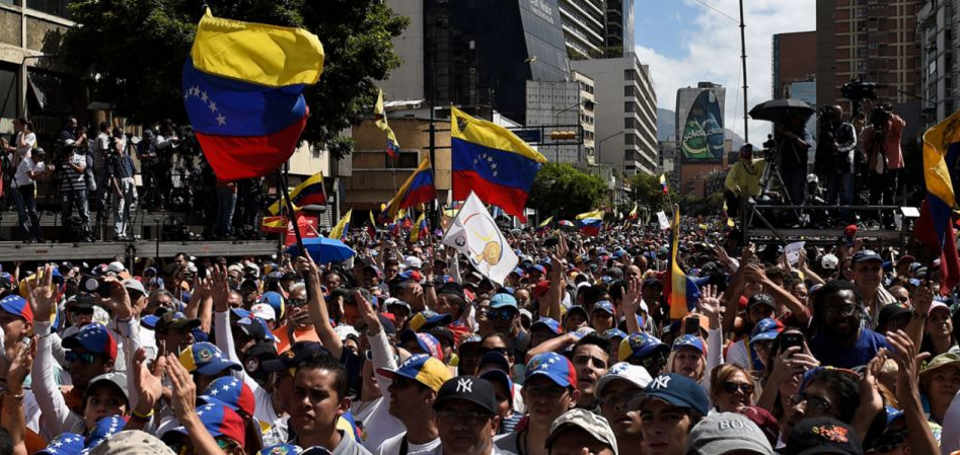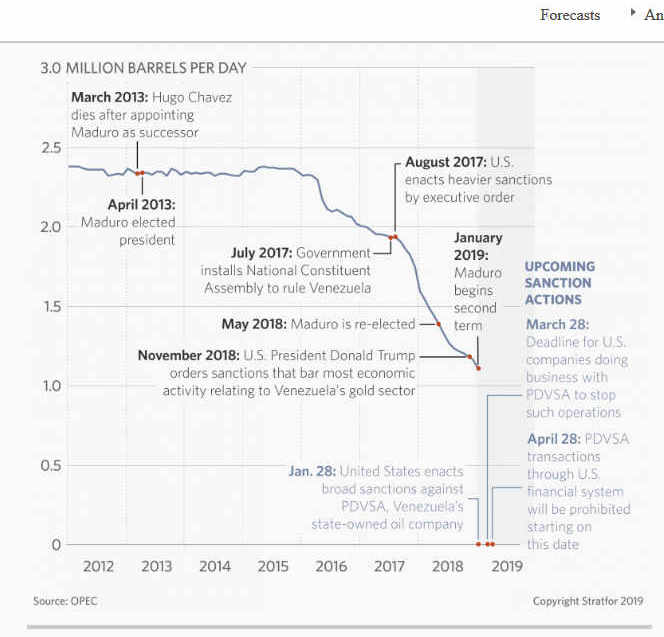The timing of any power transition in Venezuela, however, will depend on closed-door negotiations between the opposition and key armed forces commanders. For a transition to come quickly and relatively painlessly, it will need to gain the support of most regional and national military commanders in the country. Otherwise, the change in power could escalate into a conflict between dissident military units and those that remain loyal to the Maduro government.

It’s unlikely that Maduro will be able to call on his armed forces to quickly stomp out a rebellion. He’s already shied away from deploying Venezuela’s National Guard to conduct heavy repression of protests, suggesting he has doubts about military loyalty when ordered to disperse protesters.
That being said, the military’s national leadership and regional commanders have pledged loyalty to Maduro, and will not switch sides without ensuring their safety in a post-Maduro world. Therefore, persuading more commanders to join the opposition will require an expansive amnesty agreement backed by the United States, which is where many fear being extradited.
Otherwise, commanders will continue to resist — giving Maduro more time in office, as well as more time for the economic crisis to deepen. Citizens will face more severe food shortages, and even soldiers may start to go unpaid. A hungrier and poorer population makes for angrier protesters, increasing the likelihood of a violent, military-backed challenge to Maduro’s rule. And while time is not on the government’s side, nor is it on the opposition’s side. The longer Maduro stays in power, the more likely it is that their offensive to remove him will collapse. And should that happen, the government’s political opponents would then have to regroup and reconsider their path to power.
Maduro’s End Is Just the Beginning
With that said, if the opposition is able to strike a bargain with military commanders and successfully unseats Maduro, the Guaido government and its successor will first focus on revitalizing the country’s dilapidated oil and gas sectors. Oil will remain Venezuela’s main driver of export revenue for decades. And with the private sector largely in shambles after years of hyperinflation, the energy sector will also be the main source of the government’s fiscal revenue. To increase this revenue, Maduro’s successor will attempt to make investing in Venezuelan oil as low-risk as possible. But that will be a tough sell, to put it lightly.
As part of a successful transition from Maduro, the opposition’s amnesty bargain with the armed forces will likely involve allowing the military and political elites that turn on Maduro to retain a degree of influence in strategic sectors of the economy — most notably, in the energy sector. This means a new government will not only have a difficult time rooting out corruption, but that it may have to turn a blind eye to it to safeguard political stability.

Though fixing Venezuela’s energy sector will inevitably involve sending some corrupt figures to jail, an opposition-led government won’t initially be able to press too hard against fraudulent imports related to the energy sector, diversion of state revenue or extensive criminality abetted by the military. After all, its survival will depend on a well-armed military, which could easily turn on Maduro’s successor should commanders’ interests be affected.
Regardless of when and how it happens, Maduro’s exit is on the horizon. Momentum is building for regime change in Venezuela. The opposition will use the coming months to increase pressure on the Maduro administration, which is already under the weight of U.S. oil sanctions. And the longer sanctions and opposition protests last, the weaker Maduro’s grasp on power becomes, since he will lack the ability to fight back against opposition leaders or protesters without risking U.S. military action.
But even if and when the opposition successfully unseats Maduro, it will only mark the beginning of Venezuela’s long road to recovery. Bound by the bargains it made with Maduro-era elites to secure its rise to power, a new government will inherit a politically unstable, economically damaged country that will prove challenging to its rule and continued popular support.
Source: Stratfor Worldview













